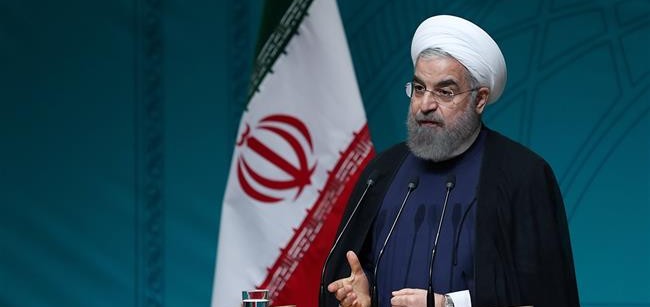PHOTO: President Rouhani: “Iran has a special place in world’s public opinion”
LATEST
Facing criticism from within Iran’s regime, President Hassan Rouhani has called for “stability and security” and declared “forward progress” in political and economic affairs.
Speaking to clerics on Saturday, Rouhani played down any divisions by saying that he would never stop to consult experts on sensitive issues.
He implicitly responded to critics of his foreign policy of engagement, including the approach that brought the July 2015 nuclear deal and the pursuit of post-sanctions economic recovery, with the declaration that “one of the points always underscored by the late Imam Khomeini [the Islamic Republic’s founder] was world’s public opinion”.
Despite the nuclear deal and success for the centrist-reformist bloc in Parliamentary elections, Rouhani has been under pressure, including from the Supreme Leader. Hardliners and conservatives have rebuffed his attempts to open up political and social space and have challenged engagement, including any links with Saudi Arabia and the US.
Since late March, the Supreme Leader has been warning Rouhani not to follow up the nuclear deal, the Joint Comprehensive Plan of Action, with a “JCPOA 2”. He has cautioned the Government against excessive pursuit of foreign investment and said that he could take over economic planning.
Last year, as he tried to ease restrictions on social behavior, Rouhani chided senior clerics for trying to take people to heaven with “the force of a whip”. On Saturday, he avoided any direct reference to the issues:
Yesterday, the people expected clerics to express God’s rules, and today, they want planning powers in addition to expressing God’s rules; and that we can protect and defend the material and spiritual interests of the country from the shortest and most direct way.
Zarif Defends Nuclear Deal in Parliament
Foreign Minister Mohammad Javad Zarif has defended the July 2015 nuclear deal in Parliament, saying the agreement prevented more US-led sanctions on Iran.
Zarif told the legislators on Sunday morning, “Sanctions were expected to increase if there was no Joint Comprehensive Plan of Action….Within several past years, there was no month or year in which new sanctions were not imposed against Iran.”
The Foreign Minister dramatically said that, had the situation continued, Iran’s oil exports — about 2.5 million barrels per day in 2012 — would now be less than 200,000 bpd and “would be zero in near-future”.
Instead, with the agreement, Iran’s oil exports had recovered to more than 2 million bpd, Zarif said.
However, amid the Supreme Leader’s hostility to any links with the US, Zarif made clear, “We never trust the US….The Iran talks were done by the order and under the supervision of the Leader.”
The Foreign Minister noted that the US has imposed new sanctions over non-nuclear issues, notably Iran’s testing of ballistic missiles, but “we have said that our response will be strengthening our missile power”.
He emphasized, “The Iran deal doesn’t mean that the animosity and hostilities of the other side against Iran have ended.”

